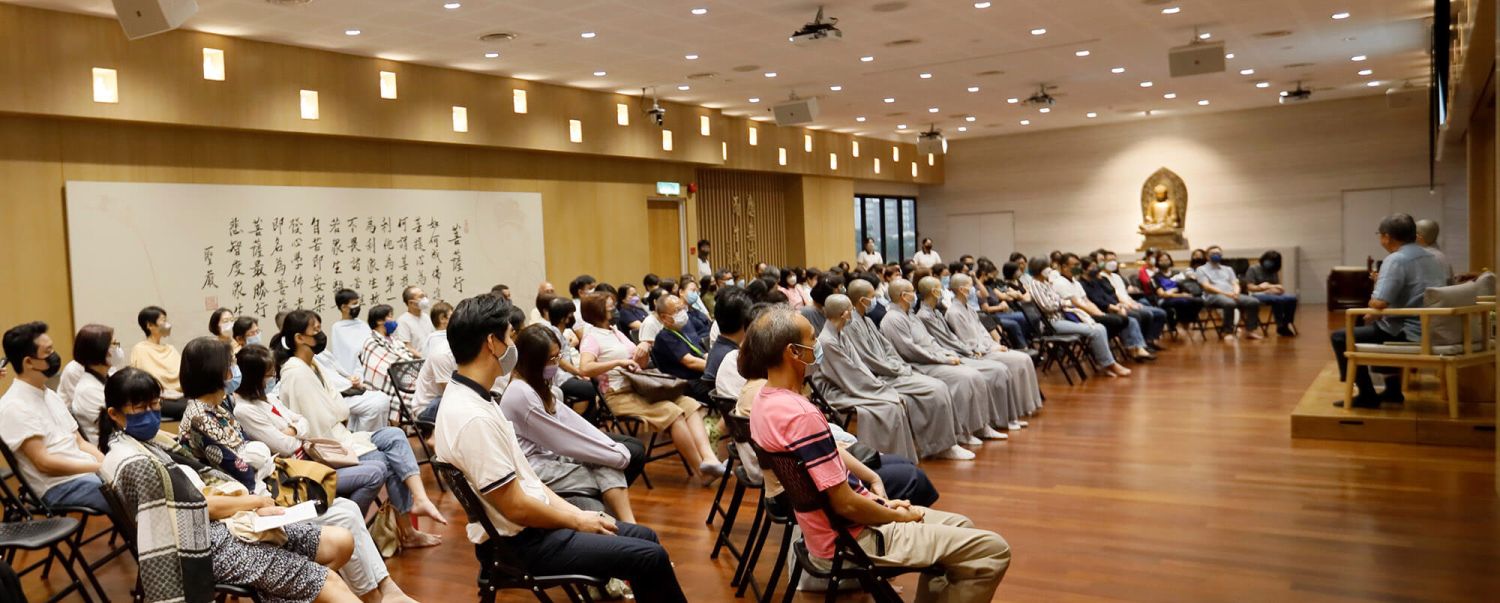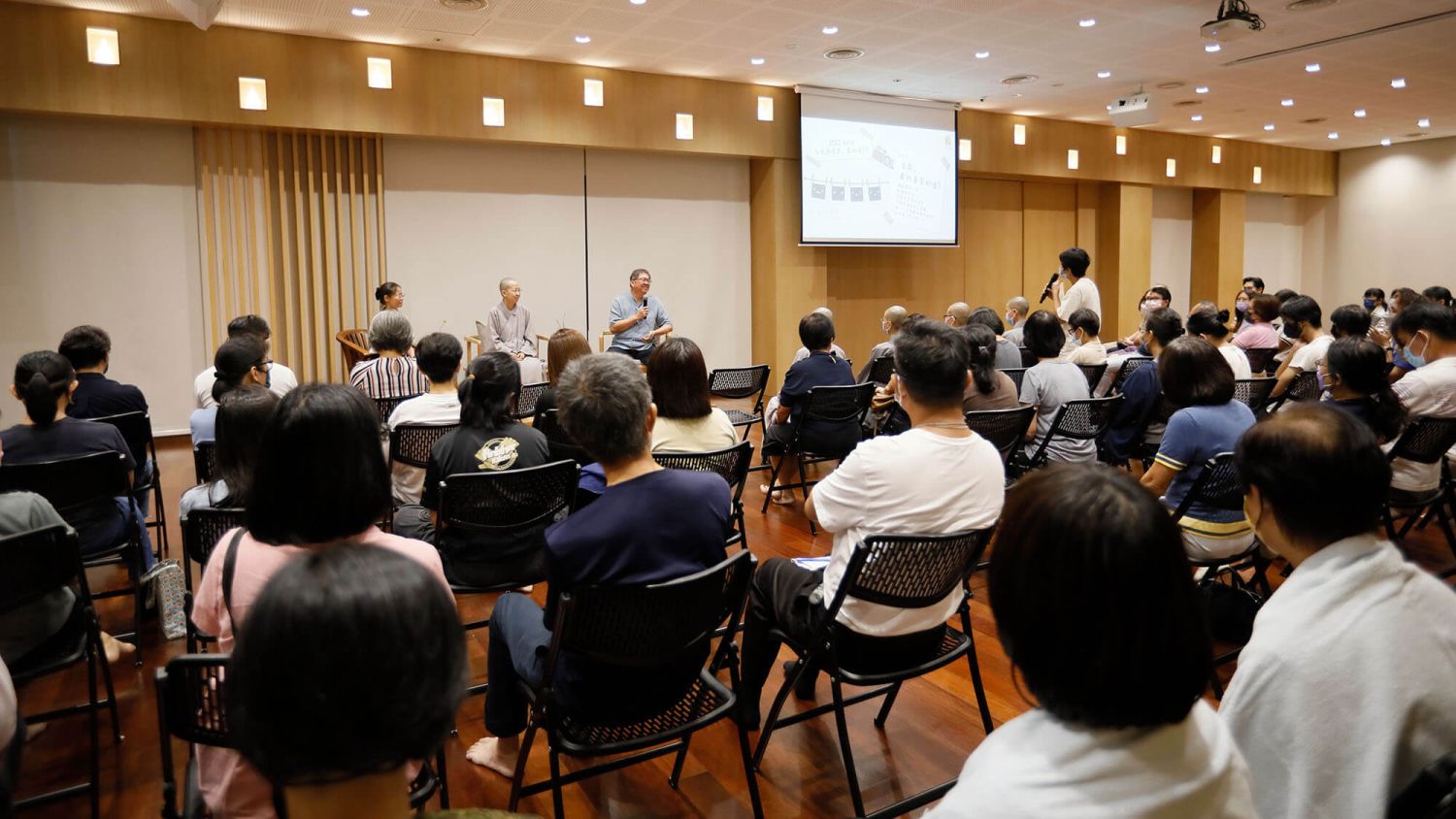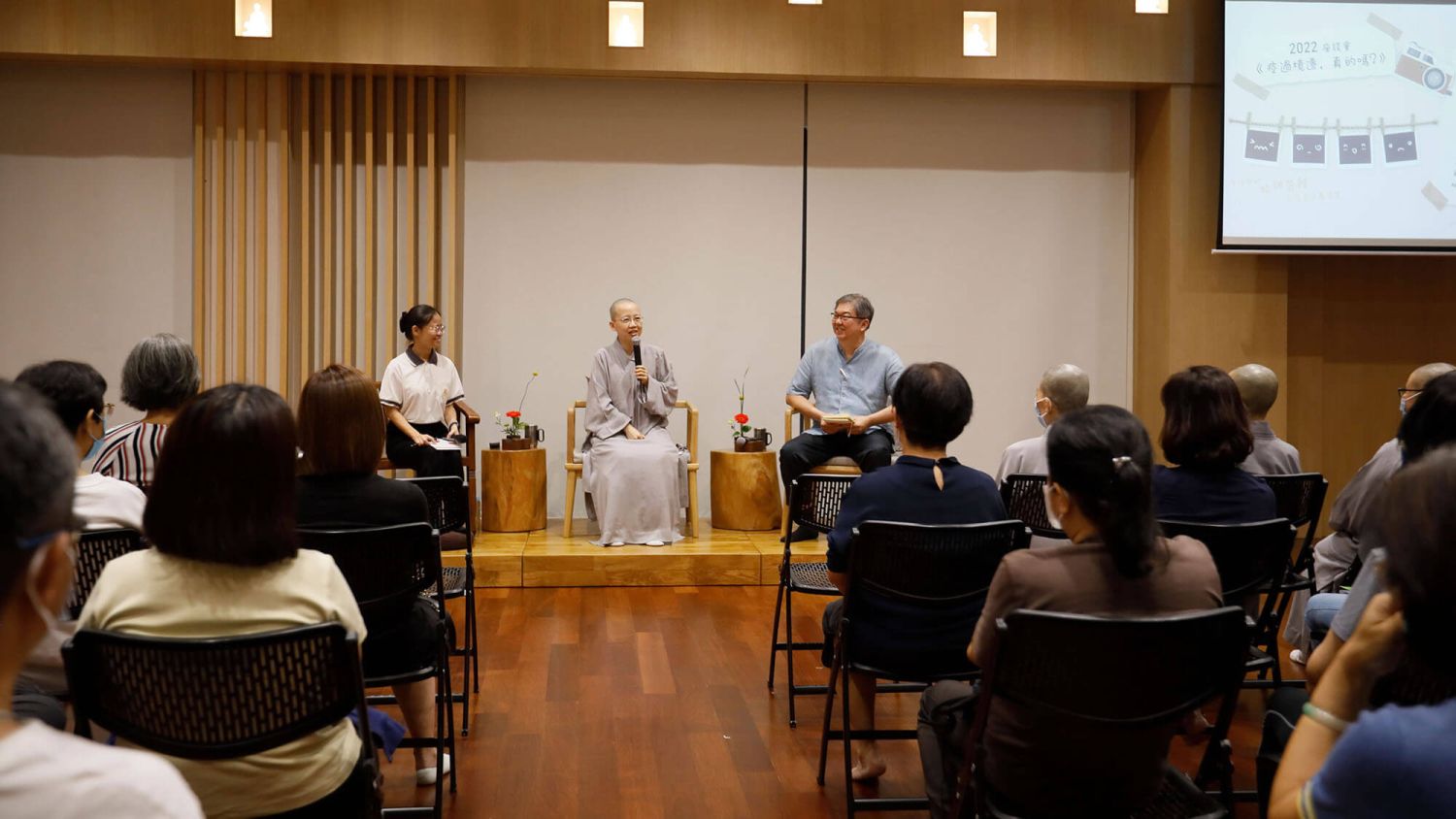DDM Global News
Transforming burdens into bodhi: Ven. Chang Zao and Wong Kah Cane on adjusting our body and mind to adapt to post-pandemic reality
 November 27, Dharma Drum Mountain Buddhist Centre Malaysia held Part Two of a forum series entitled "The Pandemic Has Passed. But Really?" This series focused on the question, "Is Life Suffering?", which is devoted to showing care toward those who are coping mentally and physically with post-pandemic
November 27, Dharma Drum Mountain Buddhist Centre Malaysia held Part Two of a forum series entitled "The Pandemic Has Passed. But Really?" This series focused on the question, "Is Life Suffering?", which is devoted to showing care toward those who are coping mentally and physically with post-pandemic  "Is it truly a good thing if we are living a plain and ordinary life, without being able to relate to the feeling of pain? Is it pessimistic to always talk about pain and distress?" As Wong Kah Cane said, maybe it is his karmic blessings that have made him become such an ignorant optimist. Life is a mixture of pains and pleasures, which is exactly why we need to apply wisdom to face it. Ven. Chang Zao explained that Buddhism is neither pessimism nor optimism; instead, Buddhism talks about facing life's situations and conditions as they are, without attaching our personal imagining or deluded thinking. For most people, suffering may be about matters, feelings, and phenomena; however, but the Buddhist idea of suffering refers to feeling unease and constrained in our life, having desires that are always unfulfilled, and being in a state of living in conflict with the external environment.
"Is it truly a good thing if we are living a plain and ordinary life, without being able to relate to the feeling of pain? Is it pessimistic to always talk about pain and distress?" As Wong Kah Cane said, maybe it is his karmic blessings that have made him become such an ignorant optimist. Life is a mixture of pains and pleasures, which is exactly why we need to apply wisdom to face it. Ven. Chang Zao explained that Buddhism is neither pessimism nor optimism; instead, Buddhism talks about facing life's situations and conditions as they are, without attaching our personal imagining or deluded thinking. For most people, suffering may be about matters, feelings, and phenomena; however, but the Buddhist idea of suffering refers to feeling unease and constrained in our life, having desires that are always unfulfilled, and being in a state of living in conflict with the external environment. As the Venerable mentioned, according to the Buddhist doctrine of "impermanence" and "no-self", all worldly phenomena are the results of various causes and conditions working together, without a substantial entity present to encompass the whole. If we can see things from an observer's point of view, we'll realize that sufferings are created by the mind. Our suffering is the result of lacking an understanding of the operating principle behind worldly phenomena and trying to fight against the phenomena. There is no need to avoid the suffering we are facing. As long as we stop creating the causes of suffering for ourselves, this is in line with the Buddhist concept of "leaving suffering behind and attaining happiness". Wong Kah Cane also added, "Only people with the experiences can relate to the taste of suffering." By seeing suffering as provisions for our practice without trying to avoid it, adapting to and recognizing the conditions as they arise, we will be able to grow and develop on the Path.
As the Venerable mentioned, according to the Buddhist doctrine of "impermanence" and "no-self", all worldly phenomena are the results of various causes and conditions working together, without a substantial entity present to encompass the whole. If we can see things from an observer's point of view, we'll realize that sufferings are created by the mind. Our suffering is the result of lacking an understanding of the operating principle behind worldly phenomena and trying to fight against the phenomena. There is no need to avoid the suffering we are facing. As long as we stop creating the causes of suffering for ourselves, this is in line with the Buddhist concept of "leaving suffering behind and attaining happiness". Wong Kah Cane also added, "Only people with the experiences can relate to the taste of suffering." By seeing suffering as provisions for our practice without trying to avoid it, adapting to and recognizing the conditions as they arise, we will be able to grow and develop on the Path.Buddhist talk of letting go of clinging and grasping does not entail escaping from or avoiding problems. Letting go begins with facing and not running away from our emotions. Instead, we return to our inner being—that is, to our mind. By using Satir's iceberg model, Wong Kah Cane illustrated that our deeper layers of emotion include feelings, expectations, perceptions, and yearnings. By returning to our mind and understanding how emotions operate, we can transform our thinking. The Venerable also cited Master Sheng Yen's four steps for handling a problem: face it, accept it, deal with it and let it go. Ven. Chang Zao added that we can practice seeing our habitual tendencies through our daily activities and try to break away from their patterns, to be able to truly let go. Transforming our way of thinking cannot be forced; it requires seeing things from another perspective.
 Wong Kah Cane expressed that, in the face of suffering, the Dharma of the mind is more important than the method itself. He believes that everyone is capable of knowing what they want as a choice. The Venerable also shared that "putting the Buddha's teaching into practice is simple and straightforward; what is complicated is the human mind." We tend to associate suffering with affliction, and that is exactly why we suffer. Instead, we should harbour a pure mind, and adopt a third-person perspective to simply observe and reflect, thinking, "This is suffering, but it is not 'I' that is suffering." Thus, by understanding the true essence of things without making judgment or criticism, we will be free from afflictions. Wong Kah Cane added that we must know how to take care of our body and mind before we can actually take care of others. Is life suffering? Our life experiences are precious resources that can help us grow. Affliction is what enables us to achieve bodhi. Only by first taking care of our mind well can we truly be care-free and at ease.
Wong Kah Cane expressed that, in the face of suffering, the Dharma of the mind is more important than the method itself. He believes that everyone is capable of knowing what they want as a choice. The Venerable also shared that "putting the Buddha's teaching into practice is simple and straightforward; what is complicated is the human mind." We tend to associate suffering with affliction, and that is exactly why we suffer. Instead, we should harbour a pure mind, and adopt a third-person perspective to simply observe and reflect, thinking, "This is suffering, but it is not 'I' that is suffering." Thus, by understanding the true essence of things without making judgment or criticism, we will be free from afflictions. Wong Kah Cane added that we must know how to take care of our body and mind before we can actually take care of others. Is life suffering? Our life experiences are precious resources that can help us grow. Affliction is what enables us to achieve bodhi. Only by first taking care of our mind well can we truly be care-free and at ease.Text: Li-hsien Chen (陳儷賢)
Photos: Shun-tsai Fang (方順才)
Translation: Vicky Wei (韋徵儀)
Editing: Keith Brown, Chia-cheng Chang (張家誠)
